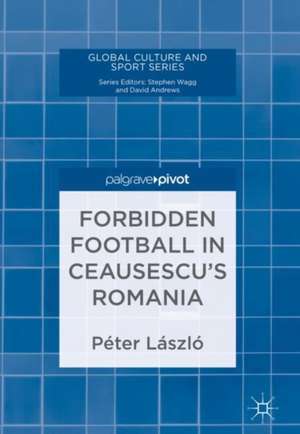Forbidden Football in Ceausescu’s Romania: Global Culture and Sport Series
Autor László Péteren Limba Engleză Hardback – 20 feb 2018
This book presents an ethnographic description and sociological interpretation of the ‘football gatherings’ that evolved out of central Romania in the late twentieth century. In the 1980's, Romanian public television did not broadcast football mega-events for economic and political reasons. In response, masses of people would leave their homes and travel into the mountains to pick-up the TV broadcast from neighbouring countries. The phenomenon grew into a social institution with a penetrating force: it produced an alternative social space and a dissident public that pointed to a form of resistance taking place through football.
Forbidden Football in Ceausescu’s Romania provides an insight into the everyday life under the pressure of dictatorship and, through the special patterns of sports consumption, it tells a social history through small individual stories related to football.
| Toate formatele și edițiile | Preț | Express |
|---|---|---|
| Paperback (1) | 379.48 lei 6-8 săpt. | |
| Springer International Publishing – 4 iun 2019 | 379.48 lei 6-8 săpt. | |
| Hardback (1) | 388.90 lei 6-8 săpt. | |
| Springer International Publishing – 20 feb 2018 | 388.90 lei 6-8 săpt. |
Din seria Global Culture and Sport Series
- 18%
 Preț: 893.84 lei
Preț: 893.84 lei -
 Preț: 389.70 lei
Preț: 389.70 lei - 15%
 Preț: 503.04 lei
Preț: 503.04 lei - 15%
 Preț: 696.02 lei
Preț: 696.02 lei - 15%
 Preț: 697.97 lei
Preț: 697.97 lei -
 Preț: 394.51 lei
Preț: 394.51 lei - 18%
 Preț: 776.72 lei
Preț: 776.72 lei - 15%
 Preț: 473.66 lei
Preț: 473.66 lei - 18%
 Preț: 730.97 lei
Preț: 730.97 lei - 15%
 Preț: 700.61 lei
Preț: 700.61 lei - 15%
 Preț: 647.73 lei
Preț: 647.73 lei - 15%
 Preț: 472.69 lei
Preț: 472.69 lei - 15%
 Preț: 647.40 lei
Preț: 647.40 lei - 18%
 Preț: 729.53 lei
Preț: 729.53 lei -
 Preț: 384.09 lei
Preț: 384.09 lei -
 Preț: 392.21 lei
Preț: 392.21 lei -
 Preț: 395.47 lei
Preț: 395.47 lei -
 Preț: 385.84 lei
Preț: 385.84 lei - 18%
 Preț: 730.65 lei
Preț: 730.65 lei -
 Preț: 390.63 lei
Preț: 390.63 lei - 15%
 Preț: 589.33 lei
Preț: 589.33 lei -
 Preț: 383.93 lei
Preț: 383.93 lei - 18%
 Preț: 730.65 lei
Preț: 730.65 lei -
 Preț: 390.63 lei
Preț: 390.63 lei - 18%
 Preț: 943.88 lei
Preț: 943.88 lei - 18%
 Preț: 1024.39 lei
Preț: 1024.39 lei -
 Preț: 388.13 lei
Preț: 388.13 lei - 18%
 Preț: 1131.71 lei
Preț: 1131.71 lei - 18%
 Preț: 896.21 lei
Preț: 896.21 lei -
 Preț: 385.47 lei
Preț: 385.47 lei
Preț: 388.90 lei
Nou
Puncte Express: 583
Preț estimativ în valută:
74.41€ • 77.90$ • 61.57£
74.41€ • 77.90$ • 61.57£
Carte tipărită la comandă
Livrare economică 05-19 aprilie
Preluare comenzi: 021 569.72.76
Specificații
ISBN-13: 9783319707082
ISBN-10: 3319707086
Pagini: 147
Ilustrații: X, 162 p. 33 illus. in color.
Dimensiuni: 148 x 210 mm
Greutate: 0.44 kg
Ediția:1st ed. 2018
Editura: Springer International Publishing
Colecția Palgrave Macmillan
Seria Global Culture and Sport Series
Locul publicării:Cham, Switzerland
ISBN-10: 3319707086
Pagini: 147
Ilustrații: X, 162 p. 33 illus. in color.
Dimensiuni: 148 x 210 mm
Greutate: 0.44 kg
Ediția:1st ed. 2018
Editura: Springer International Publishing
Colecția Palgrave Macmillan
Seria Global Culture and Sport Series
Locul publicării:Cham, Switzerland
Cuprins
1. Introduction the Ethnography and Research of Football Gatherings in Romania .- 2. Ciumani. The Sport Takes the Community to the Mountains .- 3. Bălan. Angry Men in the Night .- 4. Cluj. Big City Versions of the Football Gatherings .- 5. South-Transylvania. Further Faces of the Extended Phenomenon .- 6. The Social and Political Signifiance of Football Gatherings. Escape for Freedom .- 7. Lessons and Conclusions .-
Notă biografică
László Péter is Associate Professor at Babes-Bolyai University, Cluj. His areas of research include the sociology of sport and social problems.
Textul de pe ultima copertă
This book presents an ethnographic description and sociological interpretation of the ‘football gatherings’ that evolved out of central Romania in the late twentieth century. In the 1980's, Romanian public television did not broadcast football mega-events for economic and political reasons. In response, masses of people would leave their homes and travel into the mountains to pick-up the TV broadcast from neighbouring countries. The phenomenon grew into a social institution with a penetrating force: it produced an alternative social space and a dissident public that pointed to a form of resistance taking place through football.
Forbidden Football in Ceausescu’s Romania provides an insight into the everyday life under the pressure of dictatorship and, through the special patterns of sports consumption, it tells a social history through small individual stories related to football.
Caracteristici
Demonstrates how the consumption of ‘forbidden football’ in 1980's Romania illustrated the power of football and its potential for social mobilisation Provides an alternative social history of communist everyday life in 1980's Romania Presents the mass consumption of forbidden televised football as a form of silent resistance within Romania under a totalitarian regime
